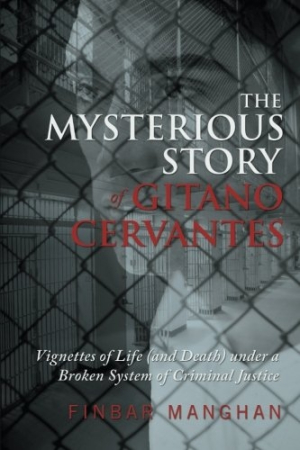The Mysterious Story of Gitano Cervantes
Vignettes of Life (and Death) Under a Broken System of Criminal Justice
Manghan offers his research and heart to give voice to those whose stories too often go unheard.
The Mysterious Story of Gitano Cervantes by Finbar Manghan is a case study–based book that surveys deeply rooted issues in the American justice and prison system.
Manghan makes no secret of the fact that he thinks the prison and court system is broken: There are two million men and women in federal, state, and local prisons across the United States; over 150,000 in California and Texas alone. In response, he tells the stories of five men imprisoned in a Southwestern state, to which he assigns the pseudonym Swest. The lives of these individuals underscore widespread problems with the chock-full justice and prison systems, including medical mistreatment, false imprisonment, rape and violence between inmates, poor mental-health treatment, and unwillingness to properly address previous trauma.
The author’s aim is to view those issues through the experiences of these men, and let that information point to solutions. The book weaves stories using a variety of sources, including summaries of court documents and proceedings, quotes from attorneys and other legal professionals, the author’s observations of the people and situations, and correspondence, journals, and poems from the prisoners. He lets the narratives speak for themselves, not watering down their urgency with unneeded editorializing.
The title story follows Gitano Cervantes, a middle-aged Mexican immigrant who suffers because of alleged mistaken identity and less-than-thorough legal representation. The men’s lives are perplexing (hence mysterious in the title), showing complication rather than easy answers. The chapter “The Rejected Child” is particularly disconcerting as the man it describes, Ken, died before Manghan was able to unravel his story in full.
The closing chapter “Beyond the Five Tales” is generous in length (adding headings would help make the information feel organized and easy to comprehend) and examines more about the men, as well as other cases and legislation that echo the problems covered by the case studies. After the disheartening, information-filled studies it would be refreshing to indicate solutions, but unfortunately there are no fulfilling answers to the resounding questions: “Will there be Accountability? Will we accept Full Responsibility for those whom We have decided to incarcerate?”
Manghan presents a beautiful gift—humanity—to those whose stories he tells. The men in this book aren’t portrayed as stereotypes or villains or victims; they are shown as people: complex, hurt, and mixed in their motives. The author highlights the heart of their stories as well as the key problems with the system. This well-balanced approach draws on Manghan’s compassion (he has served as a volunteer prison chaplain’s assistant) and his intelligence and research ability (he holds an MBA and a doctorate in moral theology). While his perspective and experience are inextricable from religion, the book focuses on human morality rather than specifically Christian ethics.
Manghan offers his research and heart to give voice to those whose stories too often go unheard.
Reviewed by
Melissa Wuske
Disclosure: This article is not an endorsement, but a review. The publisher of this book provided free copies of the book and paid a small fee to have their book reviewed by a professional reviewer. Foreword Reviews and Clarion Reviews make no guarantee that the publisher will receive a positive review. Foreword Magazine, Inc. is disclosing this in accordance with the Federal Trade Commission’s 16 CFR, Part 255.

